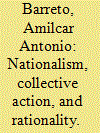|
|
|
Sort Order |
|
|
|
Items / Page
|
|
|
|
|
|
|
| Srl | Item |
| 1 |
ID:
114924


|
|
|
|
|
| Publication |
2012.
|
| Summary/Abstract |
The failure of democracy in Fiji is usually attributed to an ethnically fractured polity in which indigenous Fijians have asserted superior rights over those of immigrant communities, especially those of Indian descent. In 1987, an indigenous-dominated military ousted a government elected largely on the strength of Indo-Fijian votes, as did a civilian-led coup in 2000. Another in 2006, however, has confounded explanations of Fiji's politics based on a simple dichotomy of interests between indigenous Fijians and Indo-Fijians when the military toppled a government controlled by indigenous nationalists. A constitutional review process, supervised by the military and purportedly leading to a new, liberal constitution enshrining political equality for all ethnic groups in Fiji, is now in train. This article focuses on the historic production of indigenous nationalism and the demand for "ethnic democracy" and an assessment of the prospects for future constitutional government along inclusive liberal lines.
|
|
|
|
|
|
|
|
|
|
|
|
|
|
|
|
| 2 |
ID:
114925


|
|
|
|
|
| Publication |
2012.
|
| Summary/Abstract |
Since Olson's free-rider paradox, scholars have questioned the applicability of rational choice analyses to the study of nationalism and other forms of collective action. The most heated debates have centered on the participation of ordinary group members rather than elites. Leaders lack the material resources to adequately remunerate grassroots activists for their exploits or to individually punish defectors. This article posits that the problem lies not with the strategic thinking of nonelites but with the way rationality has been conceptualized in the scholarly literature. We should challenge the standard assumption that rational behavior is limited to accruing material rewards. This article will reexamine this conjecture in light of alternative interpretations underscoring that individuals endeavor to maximize nonmaterial utilities.
|
|
|
|
|
|
|
|
|
|
|
|
|
|
|
|
| 3 |
ID:
114923


|
|
|
|
|
| Publication |
2012.
|
| Summary/Abstract |
The discussion of the place of language in politics has generally revolved around its relationship to nation-building and ethnic conflict. Yet, these are not always causally connected nor is language easily given up for the sake of a greater national or individual good. Attitudes regarding language can be influenced by anticolonialist resentments, memories of past injustice, status paranoia, xenophobia, collective megalomania, religion, ideology, and the desire on the part of a group to base its collective identity on a demarcation from a real or imagined enemy. This applies to many dimensions of language policies, including officialization, alphabetization, gentrification, and glossonym changes. We argue that governments choose language policies for strategic reasons. Whether it is to legitimize or subordinate a language or whether or not the policy is itself the objective, these choices may have unintended consequences.
|
|
|
|
|
|
|
|
|
|
|
|
|
|
|
|
| 4 |
ID:
114928


|
|
|
|
|
| Publication |
2012.
|
| Summary/Abstract |
The development of demands advanced by ethnic minorities has received broad coverage in the scholarly literature on divided societies. Current literature offers models that predict a radicalization of minority demands as the result of diverse factors, including modernization processes, discrimination, and a mother country's support for the minority's demands. The present article offers an alternative approach, one that combines the type of minority with the type of regime as fundamental elements that shape a minority's demands. The model presented in this article distinguishes between four situations in which minorities might find themselves: an indigenous minority living in a democratic regime; an immigrant minority living in a democratic regime; an indigenous minority living in an ethnocratic regime, and an immigrant minority living in an ethnocratic regime. The demands that a minority will develop in these different situations range along an axis from radical to moderate and from secession to integration on the basis of equality in a reconstituted state. As part of my analysis, I cite several examples of minority demands across the world.
|
|
|
|
|
|
|
|
|
|
|
|
|
|
|
|
| 5 |
ID:
114927


|
|
|
|
|
| Publication |
2012.
|
| Summary/Abstract |
Focusing on the character of postcommunist extreme nationalist parties, the meaning of "the nation" and the role of historical memory in Central and Eastern Europe, the article defends the notion of "eastern" nationalism with an aim to suggest a more fruitful research into ethnic politics in the region. It argues that contemporary "eastern" nationalism has its own dynamic; it encompasses a number of themes and developments some of which confirm that the eastern part of the continent is more ethnic, but yet others that negate it and are perhaps showing a way forward in the Europe of the future.
|
|
|
|
|
|
|
|
|
|
|
|
|
|
|
|
|
|
|
|
|